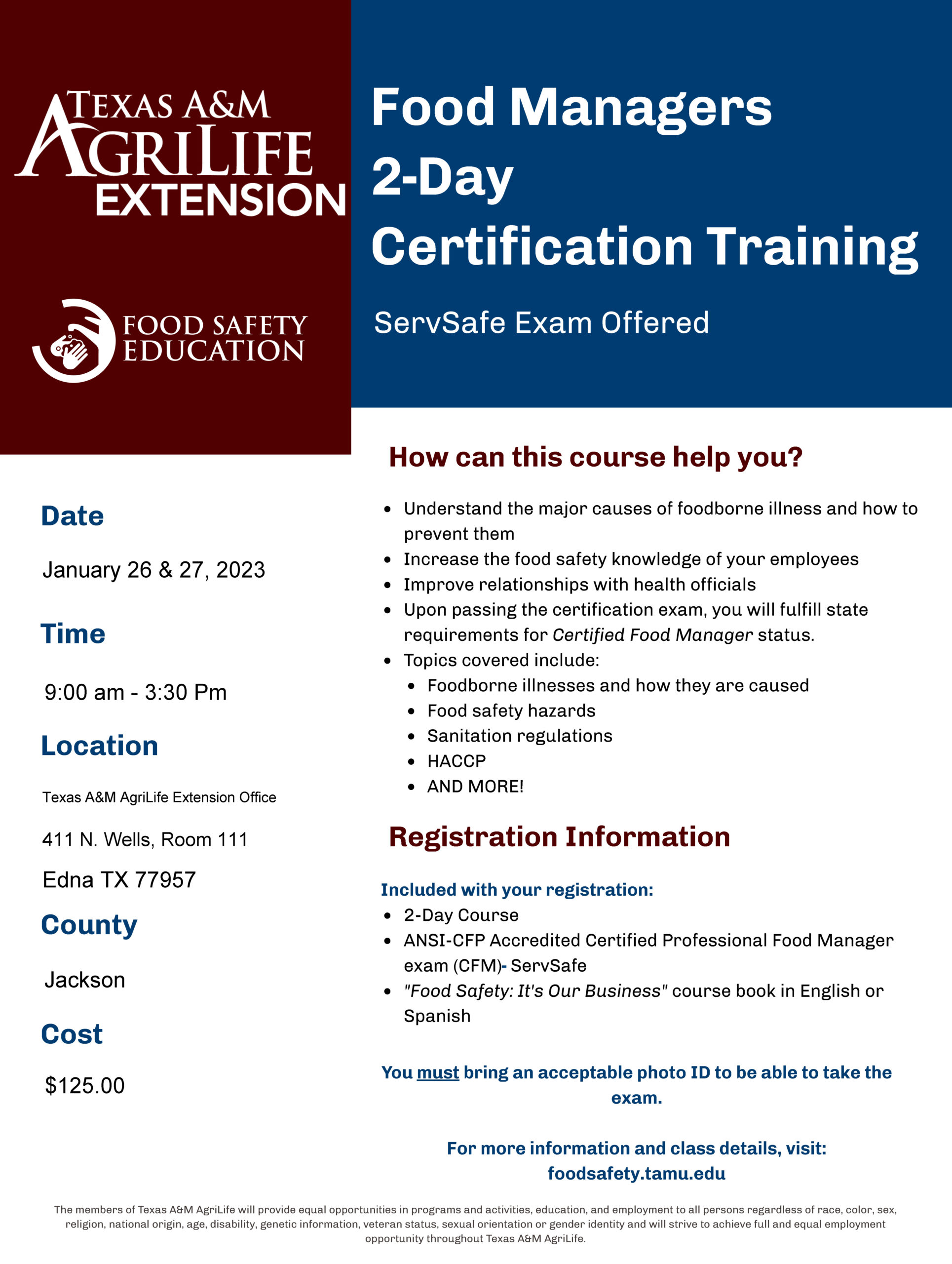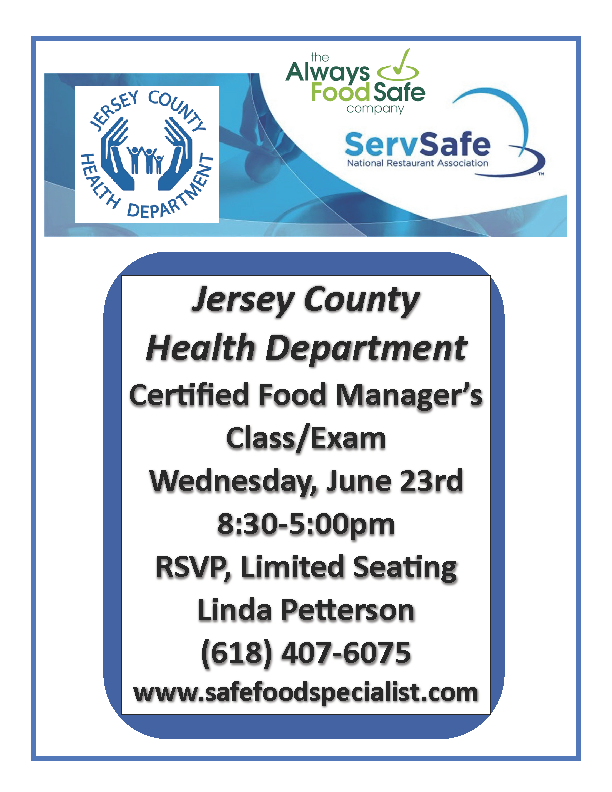A Beginner's Guide to ServSafe Food Manager Certification Preparation
A Beginner's Guide to ServSafe Food Manager Certification Preparation
Blog Article
Qualified Food Supervisor: The Trick to Safe and Compliant Operations
The role of a Licensed Food Manager (CFM) is progressively recognized as crucial in keeping certified and risk-free procedures within the food solution sector. Understanding the complete scope of their payments elevates questions about the more comprehensive ramifications for organizations and consumer trust in food security techniques.
Duty of a Licensed Food Supervisor
The function of a Certified Food Supervisor is critical in guaranteeing food safety and security and compliance within food solution facilities. These professionals are accountable for managing all elements of food prep work, storage, and handling, making sure that centers comply with wellness regulations and sector standards. Their training outfits them with the knowledge to recognize potential threats, apply appropriate food safety techniques, and maintain cleanliness protocols.
Certified Food Managers play a crucial function in training and supervising kitchen staff, instilling a society of safety and compliance throughout the establishment. They carry out routine assessments to recognize locations that need enhancement and make sure that restorative actions are carried out quickly - ServSafe Manager. Additionally, they are charged with creating and enforcing conventional operating treatments (SOPs) pertaining to food safety and security, which function as a guide for employees
Their proficiency prolongs to keeping an eye on food temperatures, protecting against cross-contamination, and taking care of irritant controls, every one of which are vital to shielding public health. Moreover, Licensed Food Managers are usually the main point of call during health assessments, representing their establishments and attending to any kind of compliance issues increased by health officials. Ultimately, their commitment to food security is vital for maintaining consumer depend on and safeguarding the track record of food solution companies.
Relevance of Food Security
Food safety and security is consistently a leading concern in the food solution industry, as it straight influences public wellness and customer confidence. Making certain that food is dealt with, prepared, and kept securely aids to protect against foodborne illnesses, which can lead to serious wellness issues and also casualties. The financial repercussions of foodborne episodes can be incredible, resulting in costly recalls, legal actions, and considerable damage to a company's online reputation.
In addition, food safety and security techniques promote a society of responsibility and professionalism and reliability within food facilities. When staff members are trained in proper food handling methods, they are more probable to comply with safety and security procedures, which minimizes the threat of contamination. This not just secures consumers yet also boosts operational efficiency and compliance with regional wellness regulations.
Customer awareness relating to food security has increased dramatically, causing enhanced expectations for transparency and quality in food solution. Establishments that focus on food safety are most likely to get client depend on and loyalty, eventually adding to their lasting success. Investing in robust food safety actions is not simply a regulative responsibility; it is an essential service strategy that profits both consumers and food service drivers alike.
Training and Accreditation Refine
Recognizing the training and certification process for food managers is essential for maintaining high standards of food safety within any establishment. The process normally begins with extensive training programs that cover essential topics such as foodborne diseases, appropriate food taking care of techniques, and hygiene techniques. ServSafe Manager Certification. These programs can be provided with numerous formats, including on-line programs, in-person courses, or workshops, and are created to furnish food managers with the knowledge needed to avoid food safety hazards
Upon completion of the training, candidates should pass an accreditation test, which evaluates their understanding of food security concepts and policies. The test is generally carried out by recognized companies, making sure that the accreditation is recognized and appreciated within the market.
When licensed, food supervisors are called for to stay present with recurring education and training to preserve their credentials. This may include going to correspondence course or joining workshops that resolve brand-new food security methods and regulations. In general, a robust training and qualification procedure not just improves the abilities of food supervisors yet likewise adds to the general safety and compliance of food procedures in any type of facility.
Conformity With Regulations
Conformity with guidelines is a crucial aspect of a food supervisor's obligations, as it guarantees that establishments abide by regional, state, and federal food security standards. These regulations are made to reduce dangers related to foodborne ailments and advertise secure food dealing with methods. A qualified food manager (CFM) plays an essential role in analyzing and carrying out these requirements within their procedures.

CFMs have to likewise implement and establish monitoring systems to consistently examine compliance with food security practices. This might involve regular examinations, document keeping, and training sessions for personnel to enhance safe food taking care of procedures (Certified Food Manager Certification). In the event of a governing examination, a CFM's readiness can significantly affect the end result, as they will certainly be accountable for showing adherence to all pertinent guidelines. Ultimately, reliable compliance monitoring promotes a culture of safety and security and responsibility within food solution procedures.

Benefits of Working With CFMs
Hiring qualified food supervisors (CFMs) provides significant benefits for food solution establishments looking for to boost their functional effectiveness and security requirements. CFMs have specialized knowledge of food security guidelines, cleanliness methods, and threat monitoring, guaranteeing conformity with regional and federal laws. This competence helps reduce the possibility of violations that might lead to expensive fines or temporary closures.
Moreover, CFMs play a crucial function in training personnel, promoting a culture of food security within the establishment. They apply standardized procedures, screen food taking care of practices, and carry out routine audits, significantly minimizing the risk of foodborne health problems. This not only shields patrons however additionally boosts the facility's reputation.
In addition, hiring CFMs can cause boosted operational performance. Their training enables team to function extra efficiently, minimizing waste and making the most of productivity. Establishments with certified food managers often experience higher customer fulfillment, as well-trained employees are better furnished to make certain high quality service and food safety and security.

Inevitably, buying a licensed food manager is an investment in the long-lasting success and sustainability of a food service operation, producing a safer atmosphere for both consumers and staff members.
Conclusion
Finally, the role of a Certified Food Supervisor is vital in keeping compliant and secure food solution operations. With effective oversight of food handling practices, ongoing staff training, and adherence to regulatory requirements, CFMs play a vital role in mitigating foodborne disease threats. The investment in certified administration not just boosts operational performance but also cultivates a society of liability, ultimately profiting both the establishment and its clients while advertising public health and security.
The role of a Certified Food Manager is crucial in guaranteeing food safety and compliance within food solution establishments.Comprehending the training and certification procedure for food managers is important for preserving high criteria of food safety within any establishment. On the whole, a robust training and accreditation process not only improves the abilities of food supervisors but also adds to the total ServSafe Food Manager Certification safety and security and conformity of food procedures in any kind of establishment.
Employing licensed food managers (CFMs) offers considerable benefits for food service facilities looking for to enhance their operational performance and safety and security standards. Facilities with licensed food supervisors commonly experience greater customer complete satisfaction, as well-trained workers are better outfitted to make certain high quality service and food safety and security.
Report this page